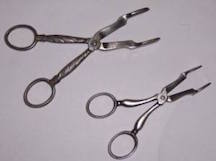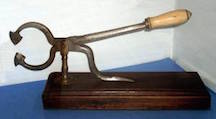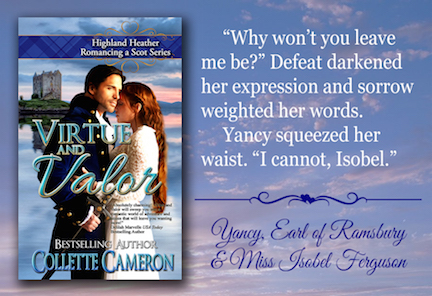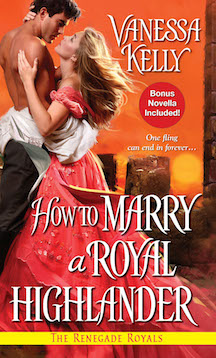In July then, 1820, we returned to the highlands, which for seven years remained the only home of the family. My Mother resisted all arguments for a return to Edinburgh this first winter, and they were never again employed. She had begun to lose her brave heart, to find out how much more serious than she had ever dreamed of had become the difficulties in which my father was involved, though the full extent of his debts was concealed for some time longer from her and the world. Some sort of a Trust Deed was executed this summer, to which I know our Cousin lame James Grant, Glemoriston’s Uncle, was a party. William was to give up the Bar, and devote himself to the management of the property. Take the forest affairs into his own hands… My father was to proceed as usual; London and the House in Spring, and such improvements as amused him when at home.
My Mother did not enjoy a country life; she had therefore the more merit in suiting herself to it. She had no pleasure in gardening or in wandering through all that beautiful scenery, neither had she any turn for Schools, or ‘cottage comforts,’ or the general care of her husband’s people, though in particular instances she was very kind; nor was she an active housekeeper. She ordered very good dinners, but as general overseer of expenditure she failed… She had no extravagant habits, not one; yet for want of supervision the waste in all departments of the household was excessive. Indolently content with her book, her newspaper, or her work, late up and very late to bed, a walk to her poultry yard which was her only diversion was almost a bore to her, and a drive with my father in her pretty pony carriage quite a sacrifice. Her health was beginning to give way and her spirits with it.
Managing the Estate
William was quite pleased with the change in his destiny; he was extremely fond of commanding, very active in his habits, by no means studious, and he had never much fancied the Law. Farming he took to eagerly, and what a farmer he made. They were changed times to the highland idlers. The whole yard astir at five o’clock in the morning, himself perhaps the first to pull the bell, a certain task allotted to every one, hours fixed for this work, days set apart for that, method pursued, order enforced. It was hard, up hill work, but even to tidiness and cleanliness it was accomplished in time. He overturned the old system a little too quickly, a woman would have gone about the requisite changes with more delicacy; the result, however, justified the means.
…
The forest affairs were at least equally improved by such active superintendence, although the alterations came more by degrees. I must try and remember all that was done there, and in due order if possible. First, the general felling of timber at whatever spot the men so employed found it most convenient to them to use their axe on a marked tree, was put a stop to. William made a plan of the forest, divided it into sections, and as far as was practicable allotted one portion to be cleared immediately, enclosed by a stout fencing, and then left to nature, not to be touched again for fifty or sixty years. The ground was so rich in seed that no other care was requisite. By the following Spring a carpet of inch high plants would be struggling to rise above the heather, in a season or two more a thicket of young fir trees would be found there, thinning themselves as they grew, the larger destroying all the weaker. Had this plan been pursued from the beginning there would never have been an end to the wood of Rothiemurchus.
…
The order he got that farm into, the crops it yielded afterwards, the beauty of his fields, the improvement of the Stock, were the wonder of the Country. This first year I did not so much attend to his doings as I did the next, having little or nothing to do with his operations. Jane and I rode as usual. We all wandered about in the woods and spent long days in the garden, and then we had the usual Autumn Company to entertain at home and in the neighbourhood.
Managing the Household
At the end of this year my sisters and I had to manage amongst us to replace wasteful servants and attend to my Mother’s simple wants… My Mother placed me in authority, and by patience, regularity, tact and resolution, the necessary reforms were silently made without annoying any one. It was the beginning of troubles the full extent of which I had indeed little idea of then, nor had I thought much of what I did know till one bright day, on one of our forest excursions, my rough pony was led through the moss above Auchnahartenich by honest old John Bain. We were looking over a wide, bare plain, which the last time I had seen it had been all wood. I believe I started. The good old man shook his gray head, and then, with more respect than usual in his affectionate highland manner, he told me all that was said, all that he feared, all that some one of us should know, and that he saw ‘it was fixed’ that Miss Lizzie should hear, for though she was ‘lightsome’ she would come to sense when it was wanted to keep her Mama easy, try to get her brothers on and not refuse a good match for herself, or her sisters should it come their way. Good, wise John Bain—‘A match for me!’ that was over, but the rest was easy, could at least be tried. ‘A stout heart to a stiff brae’ gets up the hill. I was ignorant of household matters, My kind friend the Lady Belleville was an admirable economist, she taught me much. Dairy and farmkitchen matters were picked up at the Deli and the Croft, and with books of reference, honest intentions, and untiring activity, less mistakes were made in this season of apprenticeship than could have been expected. And so passed the year of 1821.
It was new to me to think. I had never thought before. I often lay awake in the early summer morning looking from my bed through the large south window of that pretty ‘White room,’ thinking of the world beyond those fine old beech trees, taking into the picture the green gate, the undulating field the bank of birch trees, and the Ord Bain, and on the other side the height of the Polchar, and the smoke from the gardener’s cottage; wondering, dreaming, and not omitting self accusation, for discipline had been necessary to me, and I had not borne my cross meekly. My foolish, frivolous, careless career and its punishment came back upon me painfully, but no longer angrily; I learned to excuse as well as to submit, so kissed the rod in a brave spirit which met its reward… my wise Aunt found me a new and most pleasant employment. She set me upon writing essays, short tales, and at length a novel. I don’t suppose they were intrinsically worth much, and I am sure I do not know what has become of them, but the venture was invaluable. I tried higher flights afterwards with success when help was more wanted.
All this while, who was very near us, within a thought of coming on to find us out, had he more accurately known our whereabouts. He who hardly seven years after became my husband. He was an Officer of the Indian Army at home on furlough*, diverting his leisure by a tour through part of Scotland; he was sleeping quietly at Dunkeld while I was waking during the long night at the Doune. Uncle Edward, his particular friend, had so often talked of us to him that he knew us almost individually, but for want of a letter of introduction would not volunteer a better acquaintance. It was better for me as it was. I know well, had he come to Rothiemurchus, Jane would have won his heart. So handsome she was, so lively, so kind, a sickly invalid would have had no chance with him. Major Smith and Miss Jane would have ridden enthusiastically through the woods together, and I should have been unnoticed. All happens well, could we but think so; and so my future husband returned alone to India, and I had to go there after him!
*An extended leave. Born in 1780, the second son of a Co. Wicklow landowner, Henry Smith had been admitted to the King’s Inn, after which he enrolled as a Cadet in the East India Company Cavalry. He was promoted Major in 1820 and was to be Lieutenant Colonel four years later.
Memoirs of a Highland Lady
 ‘I was born on the 7th May 1797 of a Sunday evening at No. 5 N. side of Charlotte Square, Edinburgh, in my father’s own lately built house and I am the eldest of five children he and my mother raised to maturity.’ Thus opens one of the most famous set of memoirs ever written. Since its first bowdlerised edition in 1898, they have been consistently in print. This is the first ever complete text. Written between 1845 and 1854 the memoirs were originally intended simply for Elizabeth’s family, but these vivid and inimitable records of life in the early 19th century, and above all on the great Rothiemurchus estate, full of sharp observation and wit, form an unforgettable picture of her time. The story ends with the thirty-three-year-old Elizabeth finding her own future happiness in marriage to an Irish landowner, Colonel Smith of Baltiboys. ‘A masterpiece of historical and personal recall.’ Scotsman
‘I was born on the 7th May 1797 of a Sunday evening at No. 5 N. side of Charlotte Square, Edinburgh, in my father’s own lately built house and I am the eldest of five children he and my mother raised to maturity.’ Thus opens one of the most famous set of memoirs ever written. Since its first bowdlerised edition in 1898, they have been consistently in print. This is the first ever complete text. Written between 1845 and 1854 the memoirs were originally intended simply for Elizabeth’s family, but these vivid and inimitable records of life in the early 19th century, and above all on the great Rothiemurchus estate, full of sharp observation and wit, form an unforgettable picture of her time. The story ends with the thirty-three-year-old Elizabeth finding her own future happiness in marriage to an Irish landowner, Colonel Smith of Baltiboys. ‘A masterpiece of historical and personal recall.’ Scotsman
Memoirs of a Highland Lady
- Lovat, the Chief of the Clan Fraser
- The Moral Training of Great Men Began In a Cabin
- “Duchess of Sussex”
- Harvest Home
- “The short romance which changed all things for me”
- Resentment and Recovery
- Queen of Sweden
- The Last Winter in Edinburgh
- Rotterdam and Mr. George Canning
- Waterloo and the Return to Edinburgh
- Frugality, Practicality, and Much Reflection
- Further Hardships and Preparing for a Voyage
- Shipboard Life
- Life in India and Another Sister Wed
- Colonel and Mrs. Smith



































